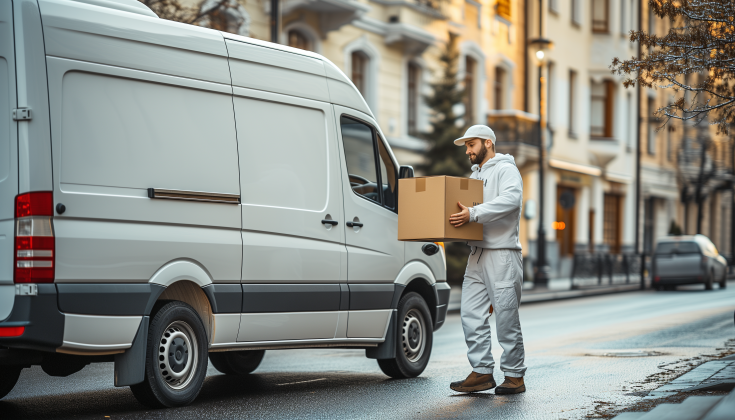Reducing the impact of urban logistics: key learnings

The Policy Learning Platform organised a webinar on 19 September 2024. Katharina Krell and Simon Hunkin, Thematic Experts for a Greener Europe, tackled the topic of reducing the impact of urban logistics. Together with the speakers and participants, they discussed how customers habits and the increase of online commerce could be mitigated with new solutions for deliveries.
With an ever-increasing number of deliveries to households and businesses, cities are struggling with increased emissions and congestion from delivery vehicles. Urban Consolidation Centres, regulations on road use, and low-carbon last mile delivery schemes can help cities to overcome this, but these approaches require new uses of ICT, new infrastructure investments, and models of collaboration between private and public sector.
The webinar presented a keynote from the University of Aveiro (Portugal), lead partners of the SPOTLOG project, on the challenges of urban logistics and their indicators on the readiness of cities for sustainable last mile delivery.
The webinar also presented good practices from the ZCI and SPOTLOG projects, as well as from the City of Milan, which had participated in the peer review for Implementing low emission zones in Romania.
Webinar agenda
Navigate the agenda below to the topic of your interest.
The webinar has been designed and moderated by Katharina Krell and Simon Hunkin, Thematic Experts for a more social Europe
00:01:20 Introduction to the topic and the Policy Learning Platform by Katharina Krell
00:09:35 Presentation by Jorge Bandeira on reducing emissions in logistics, SPOTLOG project
00:28:41 Presentation by Veronica Oppici on Milan's approach to reducing logistics vehicles emissions
00:42:31 Q&A on the time needed to make a political decision and the first changes in statistics
00:43:28 Q&A on possible measures implemented towards the Municipality's vehicles
00:44:08 Q&A on the three main barriers and challenges to implementing low-emission solutions
00:45:14 Presentation by Julien Bouvet on the partnership for the last-mile delivery between the Municipality of Lille and La Poste
00:55:46 Q&A: how is administrative cooperation working at Metropolitan level, which is larger than just the city of Lille?
00:58:35 Presentation by Giuliano Mingardo on City hubs and consolidation centres, ZCI project
01:11:42 Q&A: how do logistics providers cooperate, especially as there are many layers until the final delivery to the consumer?
01:14:45 Q&A: which kind of measures are the easiest ones for public bodies?
01:21:05 Q&A: what is the most cost-effective way in reaching the reduction of logistics emissions?
01:29:30 Key takeaways by the speakers
Key Learnings
Urban logistics have a significant impact on cities, with around 25% of trips in some cities, being related to logistics. This results in many vehicles being on the road, with corresponding carbon emissions, congestion and noise and air pollution;
In recent years, last mile deliveries (from depot to delivery address) have become more important because of e-commerce, as well as growing consumer expectations of next-day deliveries. As a result, there is an annual growth of 9% in the number of deliveries, and the market is projected to double by nearly double between 2022 and 2027, with annual carbon emissions of 5.5 million tonnes by 2032.
The transition to low-carbon vehicles such as electric vans will play a part in the transition but will not be enough by itself to tackle the negative impact. Instead, a mixture of technological and non-technological innovations will need to be applied.
These innovations can include changing the behaviour of consumers, consolidating deliveries, making use of eco-friendly delivery modes, optimising delivery routes, sharing resources between companies, and regulating to restrict harmful actions.
SPOTLOG has developed an indicator as an assessment tool to understand the readiness of cities to implement sustainable last mile deliveries. From their work, the partners emphasise:
- The importance of integrated planning to harmonise mobility, goods movement and land use;
- That public-private partnership can promote consolidation;
- That the private sector needs to be encouraged and supported to work together for mutual benefit through resource optimisation, and;
- That policy and regulation must be aligned and coherent.
Low emissions zones can play a role in managing urban logistics, placing limitations on specific types of vehicles entering parts of the city to encourage a shift to low-carbon modes, or otherwise charging for access which can encourage optimisation and consolidation of journeys.
Milan has applied just such a scheme, implementing actions since 2018 when logistics measures were included in their Sustainable Urban Mobility Plan (SUMP). Milan implemented congestion charges for commercial vehicles and phased out access for the most polluting vehicles. Since launch, there has been a 40% reduction in private cars and commercial vehicles. The city is now also exploring additional solutions for logistics through a new technical working group.
The Municipality of Lille (France) has demonstrated the benefits of collaborating with delivery companies by establishing a partnership with La Poste, the national mail delivery provider. It delivers a win-win by enabling the city to gain insights on logistics challenges and how mobility plans may impact deliveries, while La Poste can improve its efficiency and gain support for different initiatives. Together, the partnership is exploring cargo bikes, shared logistics, and alternatives to home delivery with first pilot actions and studies underway.
City Hubs and Consolidation Centres are emerging solutions for reducing logistics emissions, and an overview of these practices was provided based on a ZCI Masterclass. Different types of hubs can be established for different goods, and at different scales to enable consolidated deliveries and improved efficiency through shared infrastructure.
Public authorities at all levels will have a role in optimising urban logistics, and they should aim to learn from frontrunner regions and see what can be replicated. This can include experience sharing through Interreg Europe projects and the Policy Learning Platform which can offer on-demand expert support through peer reviews and matchmakings.
